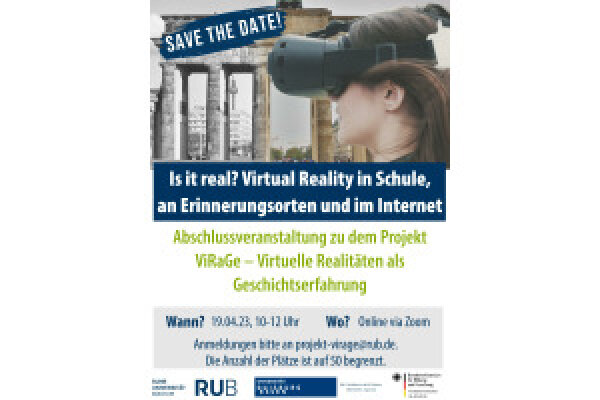
News:
Final event of the project ViRaGe
12.04.2023

Virtual Reality technologies are increasingly used in history education. However, immersive access to the applications makes it difficult for users to maintain a distance between themselves and the media representation of the past. In order to enable the process of historical thinking and learning following an encounter with virtual representations of history, students should be taught appropriate reflection skills in classroom scenarios.
The project addresses the question of how the support of metacognitive and cognitive skills can contribute to the formation of competencies for critical and reflective participation in historical culture. The aim is to investigate the impact of a hybrid learning strategy training on students' experience after using a VR application, depending on how this training is instructionally designed. Therefore, different types of training (e.g., direct, indirect, combined), different types of reflection prompts (e.g., metacognitive, cognitive prompts), and different social forms within the training (e.g., individual, small group cooperation, plenary discussion) will be varied in empirical studies in an out-of-school lab to test the effect of the respective variation on the history reflection of the participating students. In addition, empirical findings will be obtained on whether reflected historical awareness can be reliably and validly measured.
Virtual Reality technologies are increasingly used in history education. However, immersive access to the applications makes it difficult for users to maintain a distance between themselves and the media representation of the past. In order to enable the process of historical thinking and learning following an encounter with virtual representations of history, students should be taught appropriate reflection skills in classroom scenarios.
The project addresses the question of how the support of metacognitive and cognitive skills can contribute to the formation of competencies for critical and reflective participation in historical culture. The aim is to investigate the impact of a hybrid learning strategy training on students' experience after using a VR application, depending on how this training is instructionally designed. Therefore, different types of training (e.g., direct, indirect, combined), different types of reflection prompts (e.g., metacognitive, cognitive prompts), and different social forms within the training (e.g., individual, small group cooperation, plenary discussion) will be varied in empirical studies in an out-of-school lab to test the effect of the respective variation on the history reflection of the participating students. In addition, empirical findings will be obtained on whether reflected historical awareness can be reliably and validly measured.

